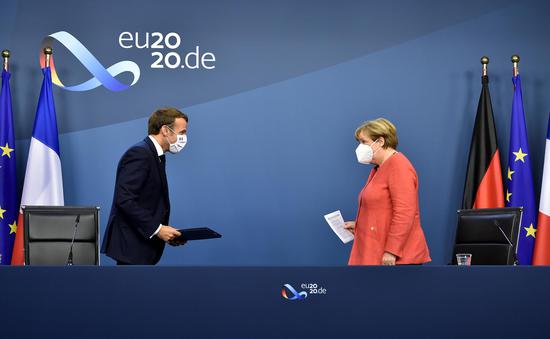EU leaders agree on 'historic' recovery package
After four days and nights of negotiations, European Union leaders reached a deal on Tuesday for a landmark 1.82 trillion euro ($2.08 trillion) COVID-19 recovery package, averting a breakdown in talks that could have endangered the bloc's unity.
"Deal," European Council President Charles Michel said on social media on Tuesday at 5:31 am.
"We did it. Europe is strong. Europe is united," he said at a news conference, calling the deal "the right deal for Europe, right now".
European Commission President Ursula von der Leyen said, "Today we've taken a historic step we all can be proud of."
Von der Leyen highlighted key concessions made in reaching a compromise and said she regretted cuts to health, research and innovation. But she emphasized that more than 50 percent of the overall budget will support policies such as the EU's Green Deal.
"We invest in Europe's future," she said.
The package comprises 1.074 trillion euros from the EU budget, known as the 2021-27 Multiannual Financial Framework, and 750 billion euros to be raised from the financial market, making it the largest joint borrowing agreed to by the EU.
The 750 billion euros portion will comprise 390 billion euros worth of grants and 360 billion euros in loans, instead of the original 500 billion euros of grants and 250 billion euros in loans, as a result of the compromise with the so-called Frugal Four-the Netherlands, Austria, Sweden and Denmark, joined in recent weeks by Finland.
French President Emmanuel Macron, who along with German Chancellor Angela Merkel supported the original deal, hailed the agreement as a "historic day for Europe".
Merkel said she was "very happy" with the deal. "What counts for me is that we ended up getting it together and that we are now all convinced of what we decided to do," she said at a news conference with Macron.
The deal will have to be approved by the European Parliament, which is expected to meet soon for a special plenary session.
Dutch Prime Minister Mark Rutte, who led the Frugal Four opposition, called the deal "a good package that safeguards Dutch interests and that will make Europe stronger and more resilient".
Austrian Prime Minister Sebastian Kurz posted a photo of the Frugal Four leaders on Twitter at 6 am, calling the deal "a good result for the EU and Austria".
The Frugal Four nations won major concessions in recent days, including a big increase in the rebates on their contributions to the EU budget.
Italian Prime Minister Giuseppe Conte, who had strongly supported the original deal, called it "a historic moment for Europe".
"We approved an ambitious recovery plan, adequate to the needs we are experiencing, which will allow us to face this crisis with strength, with effectiveness," he said at a news conference.
Italy and Spain, the EU countries hit hardest by COVID-19, will be the major beneficiaries of the deal. The European Commission forecast early this month that the EU economy would contract 8.3 percent this year.
The summit, one of the longest in EU history, was the first in-person meeting of EU leaders since COVID-19 lockdowns were imposed in March. It involved many heated bilateral, small group and plenary meetings as the Frugal Four insisted on fewer grants and more loans and strings attached to the fund.
One key negotiation involved the hole of about 10 billion euros in the Multiannual Financial Framework caused by Brexit, which has to be filled by the remaining 27 EU member states.
Fraser Cameron, director of the EU-Asia Center and a former EU official, told China Daily that "this was truly a historic deal although some painful cuts, for example, to health and climate, were made in the final haggling".
Shada Islam, an EU commentator who runs the global strategy company New Horizons Project, said the EU's breakthrough agreement is an important boost for the bloc's financial resilience.
She said it was "a sign that despite deep differences on many issues, EU leaders can come together in times of crisis".

